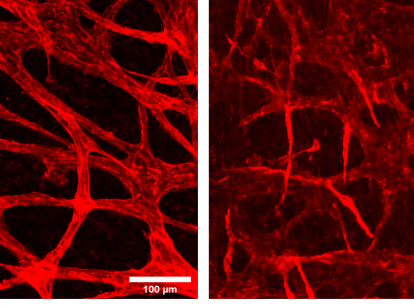Fully synthetic exosomes with therapeutic functionality
Scientists at the DWI Leibniz Institute for Interactive Materials and the Max Planck Institute for Medical Research in Heidelberg have developed fully synthetic exosomes that significantly accelerate the formation and linkage of new blood vessels in organotypic tissues.
To enable communication between the cells of our body, tiny messengers are needed that are capable of transporting signal substances back and forth at any time. This task is performed, for instance, by extracellular vesicles (EVs). These include exosomes, which can transport nucleic acids and proteins and are also responsible, among other things, for expelling cell components. The spectrum of mechanisms in which they are involved is as diverse as it is varied, ranging from immune-mediated reactions to wound healing processes.
The researchers have succeeded in synthesizing artificial structures analogous to naturally occurring EVs in the test tube using a bottom-up approach. This gives them the opportunity to copy, modify and improve natural structures for different purposes. It also allows them to bypass the labor-intensive and error-prone steps required to isolate, purify and characterize EVs from natural sources. The research team has managed to design their synthetic EVs in such a way that their properties and functions are similar to those of natural EVs involved in the wound healing process.
By treating organotypic tissues with the specially synthesized EVs, the scientists were able to demonstrate in laboratory experiments that the formation and linking of new blood vessels (neovascularization) was accelerated. This could, for example, speed up tissue regeneration after surgery or heart damage. In other experiments, it was shown that the healing process occurred significantly faster in human donor skins cultivated in the laboratory. Furthermore, the experiments enabled the identification of the most therapeutically effective EVs, so that these could be used in the future to develop vesicles tailored to patients. Their potential applications include the treatment of many diseases such as cancer, immune disorders or neurodegenerative diseases, thus providing an important basis for the development of new, innovative therapeutic approaches.

